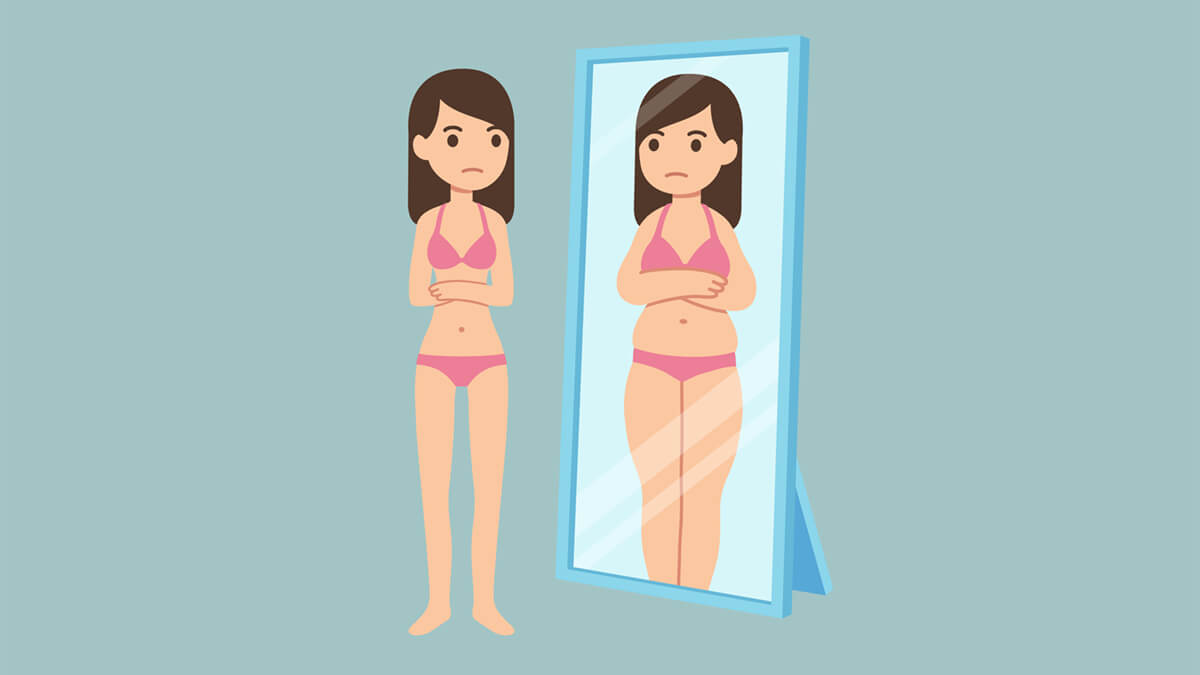In the 1970s, anorexia nervosa entered the public spotlight and became more widespread, creating new challenges for mental health counselors.1 Since then, the overall cycle of body dissatisfaction and eating disorders has worsened—especially in today’s selfie-obsessed, celebrity-centric culture. For many of those struggling with an eating disorder, body image is often the root of the problem.
Body image is defined as the manner in which people perceive themselves physically, and the thoughts and feelings that result from those perceptions. According to the National Eating Disorders Collaboration, there are four primary elements of body image:2
- Perceptual body image: How you see yourself.
- Affective body image: The way you feel about your body.
- Cognitive body image: The way you think about your body.
- Behavioral body image: Behaviors you engage in as a result of your body image.
Body dissatisfaction develops when people have negative thoughts about their own body image. Intense body dissatisfaction can damage individuals’ psychological and physical well-being. And when people begin to define their own self-worth based on their negative body image, a number of mental health issues can arise, including eating disorders.
The Role of Mental Health Counselors
Getting help for eating disorders can enable people to change their negative beliefs and behaviors. Professionals who devote their careers to treating patients with eating disorders and the issues that stem from negative body image often hold psychology or counseling degrees and are licensed in their field. If you’re interested in this career path, an online master’s degree program in clinical mental health counseling can prepare you to seek that licensure.
Mental health counselors can help those struggling with body dissatisfaction (and resulting eating disorders) by encouraging them to focus on their positive qualities, talents, and skills. Other helpful practices include setting positive, health-focused goals, and avoiding making—or exposing themselves to—negative comments about their bodies and appearance.
A positive body image is an important part of physical and emotional health, and with help, individuals can often change the way they see themselves. Clinical mental health counselors working toward this goal with patients know that a positive body image can improve things like:†
- Self-esteem, which is a measure of how highly people value themselves. High or low self-esteem often permeates many facets of people’s lives, from their personal relationships to their professional world.
- Self-acceptance, which means people are less impacted by outside influences—like unrealistic body images promoted by the media—and instead feel comfortable with the way they look.
- Behaviors and overall outlook around food and nutrition, and the benefits of living a healthy lifestyle.
If you’re interested in a career that allows you to help people who are struggling with eating disorders, earning a Council for Accreditation of Counseling and Related Educational Programs (CACREP)-accredited MS in Clinical Mental Health Counseling, like the one offered by Walden University, can help prepare you for this challenging but rewarding work.
1Source: https://www.psychologytoday.com/us/blog/evolutionary-psychiatry/201112/history-eating-disorders
2Source: www.nedc.com.au/body-image
Walden University’s MS in Clinical Mental Health Counseling program is accredited by the Council for Accreditation of Counseling and Related Educational Programs (CACREP), a specialized accrediting body recognized by the Council for Higher Education Accreditation (CHEA), which is a requirement for licensure in many states.
The MS in Clinical Mental Health Counseling program is designed to prepare graduates to qualify to sit for licensing exams and to meet the academic licensure requirements of many state counseling boards. Because no graduate program can guarantee licensure upon graduation, we encourage students to consult the appropriate agency to determine specific requirements. For more information about licensure, students should visit the National Board for Certified Counselors at www.nbcc.org/stateboardmap, the American Association of State Counseling Boards at www.aascb.org, and contact the appropriate licensing body. International students are encouraged to identify and contact their appropriate licensing body. Learn more about professional licensure
Walden University is accredited by The Higher Learning Commission, www.hlcommission.org.




